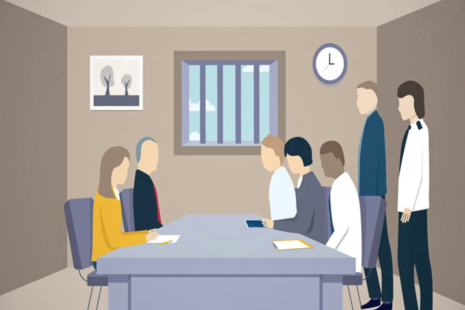When examining issues surrounding offender management, resettlement, and rehabilitation it is useful to examine the work of the Parole Board for England and Wales.
Parole is a word that originally means ‘word of honour’ but is used in modern-day England and Wales to describe the release of a prisoner on licence while the sentence is still ongoing [1].
The Parole Board was set up in 1967 to advise the Home Secretary, who was at the time responsible for the release of prisoners on licence. Offender management is now the responsibility of the Ministry of Justice [1].
Since 1967 the Parole Board has been transformed from an advisory body that did not have the final say regarding the release of prisoners, to a fully functioning judicial body that determines the length of time that prisoners will spend in custody.
The Board is an independent, court-like body. They decide whether the most serious and complex prisoners are safe to be released into the community or whether they need to stay in prison for the protection of the public.
The Board has an annual budget of £22 million to work with. Over 90% of prisoners are released automatically without Parole Board consideration, however, the Parole Board focuses on the most dangerous of offenders [2].
Prisoner release will only be considered through a parole hearing after they have served the punishment sentence period set by the court. It should be noted that parole procedures are never a way of getting out of prison early.
The parole process is focused solely on risk, however public protection is always at the heart of the conversation.

How do the Parole Board Make their Decisions?
The Board considers each case with great care. The panels receive detailed dossiers that are often many hundreds of pages long. These documents include:
- Sentencing remarks made by the judge
- A report from the Prison Offender Manager that was responsible for the prisoner
- A report from the Community Offender Manager that worked with the prisoner
- Historical psychologist reports
- Evidence from the prisoner’s security service
- Risk management plans
A panel considers what has changed and whether a prisoner can be safely managed in the community.
As a result of Covid, almost all hearings are now virtual. There are currently around 330 panel members who make independent quasi-judicial decisions in panels of up to three members.
Panel members include:
- Judicial professionals including judges and magistrates
- Legal professionals including solicitors and barristers
- Psychologists and psychiatrists
- Criminal Justice Professionals including prison officers, probation officers and the police
- Civil Servants in the Health Sector, the Education Sector, and the Military Sector
- Community workers
- Charity workers
In 2020 the Board decided that around 3,000 prisoners were safe to be released. They also recommended that 10,000 prisoners must remain in custody for the protection of the public. Each year, fewer than one in four prisoners meet the stringent statutory release test which is set by Parliament.
The overwhelming majority of people released by the Parole Board are safely managed in the community with the convicted serious further offence rate standing at around 0.5%.
A Multi-Agency Approach to Working
The Parole Board is an integral part of the Criminal Justice System, and they rely heavily on other agencies for reports and professional recommendations.
For example, during an oral hearing the probation officer and the prison service providers of the prisoner will attend and provide evidence on the case. The Parole Board has a duty to respect all roles that are connected to the prisoner; however, they must ensure an appropriate flow of accurate information is fed into the hearings.
There can be delays in the process if external sources of information do not provide adequate evidence-based information. For example, when a prisoner is recalled from parole, the Board needs to understand the exact reasons why. This information must come from the other professionals attached to the case and the Board are occasionally left waiting for these details.
Multi-agency working is highly important during the reintegration of the prisoner into society. The prisoners have often spent decades in prison and struggle to know how to support themselves in society. The Parole Board must ensure that local authorities such as social services and employment services have measures in place to support the individual to find appropriate housing and work opportunities.
Victims and the Parole Board
Given the very sensitive nature of the work the Parole Board aims to treat all victims with humanity and respect,. Victims are entitled to be updated on a prisoner’s progress in custody and can attend oral hearings.
Since May 2018, victims can receive a summary of the reasons for the Parole Board’s decisions. The Board has issued over 4,500 summaries. With the pandemic offering remote hearings, more victims have been encouraged to attend.
Sometimes the victims have a confused perspective towards the parole process. Quite often, they do not understand that the process is based on risk instead of punishment. The Parole Board, therefore, strives to ensure that victims feel comfortable throughout the process by providing ongoing support.
Risk Assessing Terrorism Act Offenders
Following the London terrorist atrocities, the remit of the Parole Board was expanded under the Terrorist Offenders (Restriction of Early Release) (TORER) Act 2020 and now all Terrorist Act offenders are assessed by the Board.
The Board estimates that this will increase Terrorist Act offenders’ referrals from under 50 a year to over 200 a year. They have established an end-to-end policy that brings all the strands of work on Terrorist Act offenders into one place.
There is an established cohort of over 50 specially vetted and appropriately trained members to deal with these offenders, specifically when there is a concern that the offender has links to extremism. In April 2021 the Board launched a recruitment drive for additional members with specialist knowledge.
Additionally, the Board have established stronger links with anti-terrorism police, anti-terrorism security services, and the National Probation Service’s extremist offender unit.
The overarching aim is to ensure that the Board has the skills to deal with these cases and that there is an adequate amount of multi-agency input into the acquirement of evidence-based information in the assessment of a Terrorist Act Offender.
Why does Parole Matter?
The decisions of the Board are often considered controversial because many of the prisoners that are reviewed have committed very serious offences and have caused huge harm to victims and the wider public. However, the law requires that an independent body should review the lawfulness of detention after the period of punishment.
The parole system provides hope and incentivises engagement with rehabilitation services. It recognises that people have the capacity to change and that people are deserving of second chances where appropriate.
Parole provides prisoners with a structured, supported, and supervised transition into life back into the community, rather than expecting an individual to instantly readapt.
Prison is a very structured environment, so it can be very challenging for prisoners to reintegrate. Parole procedures provide a level of damage control that ultimately works to protect the public.
The decisions made are purely based on the law and evidence is gathered with great care.
[1] Justice.org. The Parole System of England and Wales
2] Corby, Caroline. 2021. Chair of the Parole Board for England and Wales
Register FREE to access 2 more articles
We hope you’ve enjoyed your first article on GE Insights. To access 2 more articles for free, register now to join the Government Events community.
(Use discount code CPWR50)




